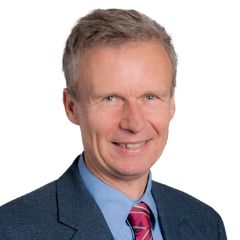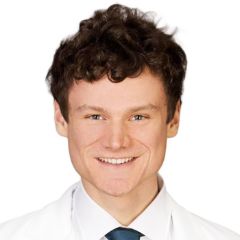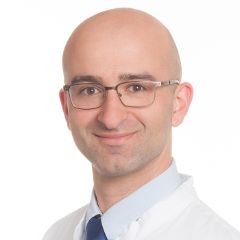Cardiac and thoracic diagnostics
The department deals with the thoracic organs (heart, lungs) and adjacent structures such as the aorta and pulmonary arteries. We are involved in patient care, research and teaching and carry out around 32,000 examinations every year.
Five specialists currently work in our department.
Procedure
We use imaging procedures to examine pathological changes in the thoracic organs such as inflammation and tumors of the lungs, circulatory disorders of the heart muscle, diseases of the heart valves, dilatations of the aorta or occlusions of pulmonary arteries. Our methods such as computed tomography (CT), magnetic resonance imaging (MRI), conventional X-rays and our nuclear medicine procedures (myocardial perfusion scintigraphy, SPECT/CT and PET/CT) are particularly gentle and meet the latest standards (detailed information on nuclear medicine procedures can be found on the pages of the Department of Nuclear Medicine). We work closely with cardiologists and surgeons to ensure optimal diagnostics and treatment for our patients.
Research and teaching
Our scientific focus is currently on applications of artificial intelligence (AI) in heart and lung diagnostics. For example, we are improving the detection of pulmonary embolisms in computed tomography or describing the extent of pneumonia in the context of COVID-19 disease. We also hold numerous teaching events and conferences for medical students, medical-technical radiology specialists (MTRAs), radiologists and interested parties from other disciplines. We offer a fellowship to deepen your knowledge in our field.
We conduct both basic and clinical research and work closely with the Department of Radiological Physics, the Department of Research & Analysis Services in the D&ICT Division and our clinical partners at the University Hospital Basel. Our scientific commitment serves the further development of new procedures for the acquisition and post-processing of image data and the evidence-based embedding of modern methods in diagnostic strategies. The focus is on the patient's need for diagnostics that are as accurate, efficient and low-risk as possible.
Our current research focuses on
- Automated detection and characterization of lung diseases in computed tomography (CT) using artificial intelligence (AI). Examples of this include the detection of pulmonary artery embolisms and the characterization of lung changes in the context of pneumonia in COVID-19
- Automated measurement of the heart cavities, coronary arteries and aorta using AI. This includes the determination of cardiac function and volumes in magnetic resonance imaging (MRI) and the detection of narrowing of the coronary arteries in CT (in cooperation with the Department of Cardiology at the USB)
- Research into the morphology and function of the left atrium (in cooperation with the Department of Cardiology, Division of Electrophysiology)
- Imaging inflammation of the aorta and major vessels using MRI (in cooperation with the Department of Rheumatology)
- Gentle examination of the lungs using MRI with the inclusion of morphological and functional information (in cooperation with the Department of Radiological Physics)
- 3D visualization of CT data for planning thoracic surgery operations (in cooperation with the 3D Print Lab and the Department of Thoracic Surgery)
Cardiac and thoracic diagnostics staff
Department management

Prof. Jens Bremerich
Leitung kardiale und thorakale Diagnostik
Leitung Aus-, Weiter- und Fortbildung, Radiologie und Nuklearmedizin
Tel. +41 61 328 63 44
Senior physicians

Dr. Christian Gernhardt
Stv. Oberarzt und Fellow kardiale und thorakale Diagnostik
Radiologie und Nuklearmedizin
Tel. +41 61 328 51 74
Dr. Stefan Gherca
Stv. Oberarzt und Fellow kardiale und thorakale Diagnostik
Radiologie und Nuklearmedizin
Tel. +41 61 328 49 14

PD Dr. Maurice Pradella - EBCR
Kaderarzt, stv. Leitung kardiale und thorakale Diagnostik
Radiologie und Nuklearmedizin
Tel. +41 61 556 59 07

Dr. Jedrzej Sarnecki
Stv. Oberarzt und Fellow kardiale und thorakale Diagnostik
Radiologie und Nuklearmedizin
Tel. +41 61 328 49 18
Assistance
